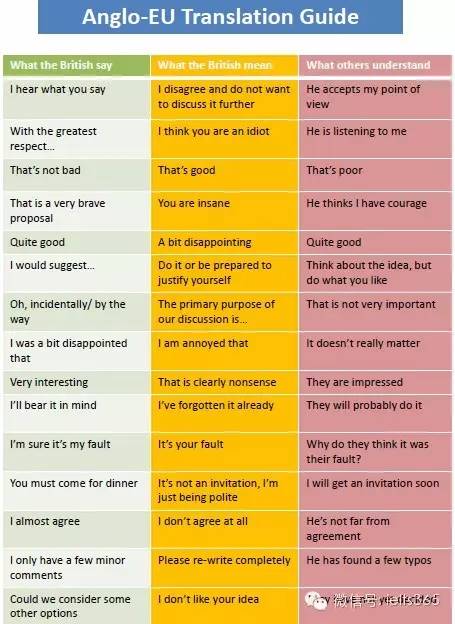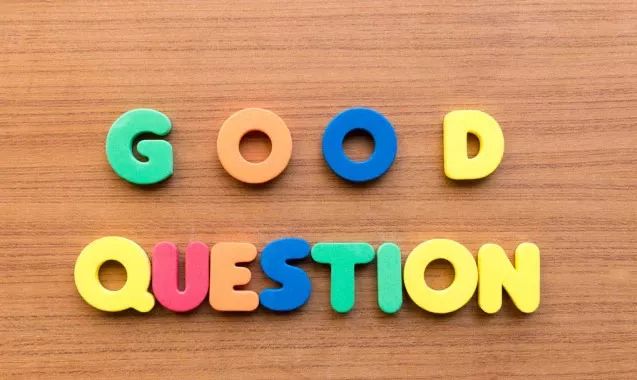中國人的英語以Chinglish或Chenglish聞名于世。中國人最大的英語發音問題就是沒有連讀,但這都不是最主要的語言問題。老外們時常議論,很多中國人在說英語時聽起來沒有禮貌;並不是這些中國人本身沒禮貌,而是他們還沒有習慣英語的禮貌表達方式。
比如,中國人在餐廳或咖啡廳,會說:“我想要一個漢堡包”或者“我想要一杯咖啡”。但是,如果直接把這些話翻譯成英語“I want to have a hamburger.”或“I want to have a coffee.”老外們會覺得這樣說話很沒有禮貌,當然他們也不會直接告訴你。而在西方國家,老外們一般會說:“Could I have a hamburger, please?”或“Can I have a coffee, please?”
再 比如,中國人在拒絕別人邀請的午宴或晚宴時,會說:“抱歉,我不能去,我還有別的安排。”翻譯成英文就是“Sorry,I can’t. I have another appointment.”如果這樣說,那別人第二次也許不會再邀請你了。老外們一般會這樣說:“That is a good idea! I would like to join in but I have another appointment today.”
我們可以從中總結一些“有禮貌”的技巧:
1、 西方人(主要指有一定修養的歐美人)在與他人交流時,比較多地使用情態動詞:can、could、may、might、would等等;情態動詞 (Model Verbs)又稱爲情態助動詞(Model Auxil-iaries),表示說話人的語氣,可表達建議、要求、可能和意願等,使得說話的語氣比較有禮貌。
2、 比較多地使用虛擬語氣,比如would (had) rather、would (had) sooner、would (just) as soon等等,或者在陳述句中使用過去式表示虛擬語氣,或者使用if等引導的從句表示“可能性”。這樣說話可以使人感覺表達者是在考慮達到最佳的結果或方 式,盡量避免不好的結果或方式,或者推測可能出現的問題,並找出可能解決的辦法。
3、 往往在句尾加please,而不是在句首加please。當please用在句首的時候,語氣聽起來就比較強,聽起來像命令。比如請求別人做某事的時候, 我們中國人會說“請在周一前給我回複。謝謝。”但是如果你直接用英語說“Please reply to me by Monday. Thank you.”聽者會覺得你是在命令他,一點禮貌也沒有。而如果這樣說:“Could you please reply to me by Monday? Thank you.”就顯得有禮貌了。
4、在陳述句的表達可能顯得生硬、沒禮貌時,盡量使用疑問句、否定句或從句,盡量避免自己的主觀判斷或武斷,以積極的、建議的、比較的、人性的語氣,代替消極的、命令的、直接的、武斷的語氣。
5、 說話要以他人爲中心,以肯定他人、贊同他人爲前提,讓自己顯得謙卑、渺小。說完之後,還要附帶一句“Thank you”或“Thanks”。其實,這種禮貌的表達方式是來自古老的中國。這是東西方文化的共同點,也是爲人處世的基本原則。了解英語中禮貌的表達方式, 盡量讓自己的英語表達更有禮貌,融入社會。
說到這裏我們索性再八一八英國人那些弱爆了的思維吧:
你應該注意英國人說話的“弦外之音”。當英國人誇你“很不錯”時,當英國人“順便說一句”時,當英國人說“基本同意”時,他們想表達的實際含義可能不是你理解的那個樣子,千萬不要誤會他們意思鬧出笑話。
When the British say “I hear what you say. ” They mean “I disagree and do not want to discuss it further.” But what others understand is “He accepts my point of view.”
當英國人說“我聽到你所說的了”時,他們的意思是“我不同意也不想就其做進一步討論”,而其他人卻理解成了“他接受了我的觀點”。
When the British say “With the greatest respect… ” They mean “I think you are an idiot.” But what others understand is “He is listening to me.”
當英國人說“出于最大的尊重…”時,他們的意思是“我覺得你太二了”,而其他人卻理解成了“他正聽我說話呢”。
When the British say “That”s not bad. ” They mean “That”s good.” But what others understand is “That”s poor.”
當英國人說“不算太糟”時,他們的意思是“太好了”,而其他人卻理解成了“太差了”。
When the British say “That is a very brave proposal. ” They mean “You are insane.” But what others understand is “He thinks I have courage.”
當英國人說“那真是一個非常有勇氣的提議”時,他們的意思是“你真是瘋了”,而其他人卻理解成了“他覺得我很有膽識”。
When the British say “Quite good. ” They mean “A bit disappointing.” But what others understand is “Quite good.”
當英國人說“很不錯哦”時,他們的意思是“有點小失望”,而其他人卻理解成了“真心不錯”。
When the British say “I would suggest… ” They mean “Do it or be prepared to justify yourself.” But what others understand is “Think about the idea, but do what you like.”
當英國人說“我想建議的是……”時,他們的意思是“去實踐或者做好准備證明你自己”,而其他人卻理解成了“考慮一下他的點子,但還是做我想做的”。
When the British say “Oh, incidentally / by the way… ” They mean “The primary purpose of our discussion is…” But what others understand is “That is not very important.”
當英國人說“順便說一句……”時,他們的意思是“我們討論的最根本目的是……”,而其他人卻理解成了“接下來的話不是非常重要”。
When the British say “I was a bit disappointed that… ” They mean “I am annoyed that…” But what others understand is “It doesn”t really matter.”
當英國人說“我對……有點小失望”時,他們的意思是“我對……很惱火”,而其他人卻理解成了“無傷大雅”。
When the British say “Very interesting. ” They mean “That is clearly nonsense.” But what others understand is “They are impressed.”
當英國人說“非常有意思啊”時,他們的意思是“那明顯是瞎扯淡”,而其他人卻理解成了“那真是讓人印象深刻”。
When the British say “I”ll bear it in mind. ” They mean “I”ve forgotten it already.” But what others understand is “They will probably do it.”
當英國人說“我刻在腦子裏了”時,他們的意思是“我已經不記得了”,而其他人卻理解成了“他們大概會去做的吧”。
When the British say “I”m sure it”s my fault. ” They mean “It”s your fault.” But what others understand is “Why do they think it was their fault?”
當英國人說“我確定是我錯了”時,他們的意思是“那其實是你的錯”,而其他人卻理解成了“爲什麽他們會覺得是他們的錯呢?”
When the British say “You must come for dinner. ” They mean “It”s not an invitation, I”m just being polite.” But what others understand is “I will get an invitation soon.”
當英國人說“你一定要來赴宴”時,他們的意思是“那絕不是什麽邀請,我只不過想禮貌一些”,而其他人卻理解成了“馬上我就會收到一個邀請了”。
When the British say “I almost agree. ” They mean “I don”t agree at all.” But what others understand is “He”s not far from agreement.”
當英國人說“我基本同意”時,他們的意思是“我一點兒都不同意”,而其他人卻理解成了“他真的是非常非常同意啊”。
When the British say “I only have a few minor comments. ” They mean “Please re-write completely.” But what others understand is “He has found a few typos.”
當英國人說“我只是有一點兒建議”時,他們的意思是“請從頭到尾地重寫一份吧”,而其他人卻理解成了“他只不過發現了一些言語錯誤”。
When the British say “Could we consider some other options?” They mean “I don”t like your idea.” But what others understand is “They have not yet decided.”
當英國人說“我們可以再考慮一些其他的選擇嗎?”時,他們的意思是“我著實不喜歡你的點子”,而其他人卻理解成了“他們還沒有決定下來吧”。
如何把英語說得更得體更禮貌?
英語客套話了解一下
英國人向來以含蓄著稱,這個特點也體現在他們的日常表達上。他們有些日常用語表達的意思很微妙,有時連其他英語國家人士都無法完全理解,更不要說我們這些英語學習者了。
你聽得懂英語中的客套話嗎?還有哪些常見的英語口語表達會被你誤會呢?一起來看看吧!
1
That’s interesting.
當一個英國人跟你說“That’s interesting.”你也不知道他到底是說真的“有意思”還是“很傻逼”,或者是“很奇怪”,總之你不能完全按照字面上的意思去理解。
Example:
Check this out. It’s interesting.
看看這個視頻,很有意思。
A: Oh I made a mistake ….
B: That’s interesting.
這裏的“That’s interesting.”可能是表示“很奇怪”,也可能是表示“你是個傻逼”。
It’s interesting that we found its color would change over tim.
很奇怪,我們發現顔色會隨著時間改變。
2
That’s a good question.
以前和外教聊天時,經常會聽到歪教說: “That’s a good question!”剛開始認爲外教在誇我:”嗯,你提的問題很好。”每次聽到這句話都沾沾自喜,我提的問題真的太有水平了。時間久後才明白,”That’s a good question!”能表達好多種意思!
Example:
1.當受到別人責備時,”That’s a good question!”表示: 哎呦,你這個問題好,我准備好充分的理由來回答你。
A: Well,if your partner is so worked up, why isn’t he here?
A: 既然你的搭檔那麽熱衷,他爲什麽沒在?
B:That’s a very good question. It’s because he starts things and he doesn’t finish them, so then I heve to.
B: 你這問題問的真好,那是因爲他習慣了做事有始無終,所以我就要替他收場。
2. 當遇到難纏的麻煩事,”That’s a good question!”表示: 這是一個好問題,確實也很棘手。但是我是如此的機智而且考慮周到,問題已經被我解決了。
A: Is it gonna fit through the door?
A:能搬進來嗎?
B:Well, that’s a good question. I got a team of guys coming tomorrow.
B: 呃,這是個好問題,我叫了一幫家夥明天過來。
3. 當別人問了你一個難以立即回答的問題時,”That’s a good question!”也還可以表示:哎呦,你這個問題問得好。可是這到底是什麽鬼?我怎麽知道?
A:Who among us understands what to do about Pakistan?
A:我們中有誰知道該爲巴基斯坦做些什麽?
B:Well, a good question.
B:這是個好問題。
4. “That’s a good question!”還有一種意思:我要開始怼你了,你小心點。一般後面會回答: “Ask Yourself.”
A:Why don’t the players decorate our lockers?
A:爲什麽不是球員來裝飾我們的儲物櫃?
B:That’s a very good question you should asked yourself before become a cheerleader.
B:你應該在當上拉拉隊員前問自己這個問題。
3
I’ll think about it.
如果你覺得對方說“I’ll think about it”是指“我要考慮一下”,那你可能永遠等不到結果。在英文裏I’ll think about it是完全沒希望的,就等于no…
Example:
1. 當你向別人提議I guess we can try this way. 他回答I’ll think about it. 其實就是委婉告訴你,這個方法欠妥,我不想試。
2. 如果別人給你推銷東西,如果你不想買,你說“I’ll think about it.” 他就知趣了知道你不想要。
注意:
英語裏如果真的要表達“我要考慮一下”怎麽說呢?也是“I’ll think about it.”這句話,只是說完之後還得說點別的,比如你爲什麽要考慮。如果只是單純地說I’ll think about it 那就等于no.
4
It would be nice if you could
“It would be nice if you could”這個句型在商務英文信函中經常使用到。如果別人想要你做一件什麽事情,說“It would be nice if you could…”看上去好像輕描淡寫,不強求,實際上心裏想要得不要不要的。
Example:
It would be nice if you could provide a bit more information on the user’s behavior。
您若是能夠就用戶行爲方面提供更多的信息就太感激了!
5
It seems that…
當別人煞有介事地跟你說“It seems that”時,明明他已經掌握了實錘,卻還是要故作高深地說seem。
Example:
It seems that there is a mistake.其實就等于I’m sure you made a mistake.(我確定就是你犯了錯。)
總而言之,中文表達英文對于結果和一些附加條件比較在意,就如同我與朋友去某某餐廳吃飯,而英文將吃飯作爲主要主幹,人和餐廳作爲附屬。
I go to ABC company to eat with my friends.是不是感覺重點不一樣了?
文化的差異導致表達的不同,被認爲不禮貌也都是可以理解的。
我們爲讀者提供各類資訊外,也爲大家提供各類新加坡留學等資訊,及如何在新加坡中英文業余學習(課程可申請政府津貼),中英文教學會計ACCA課程,精品雅思班,提升學曆等
我們還專設新加坡留學和澳洲留學業務
歡迎電話:84258441,添加微信:jasonjuven
童老師
掃二維碼關注我的文章
推薦閱讀:








